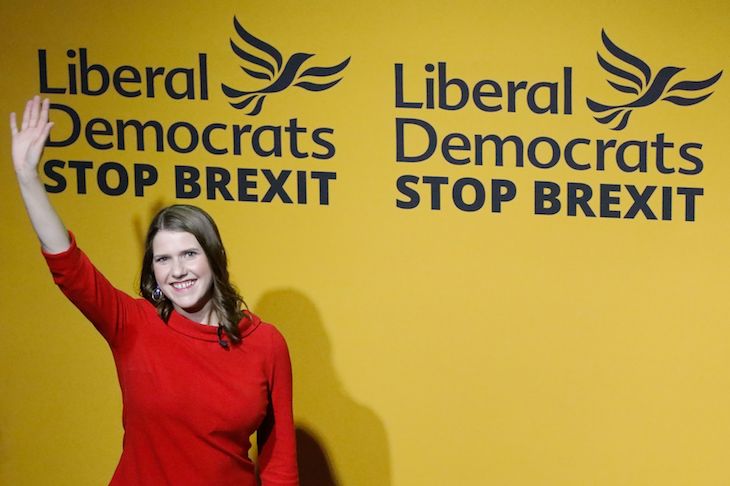Everyone knows the Lib Dems want to stop Brexit, but that’s not always been true of its voters. Some 750,000 of them backed Leave in the 2016 referendum; one-third of all those who’d voted for the party in the previous year’s general election.
One thing’s for sure: Jo Swinson’s ‘Stop Brexit’ campaign is not designed to win these voters back. A recent YouGov poll suggested just four per cent of Leave voters will support the Lib Dems at this election. Instead, the party has banked its fortunes on being the ‘Remainiest’ party contesting this election, as part of its effort to build a ‘core vote’ based on a coherent set of values – rather than, as in the past, relying on the Stakhanovite efforts of individual MPs in seats dotted around the country to keep the liberal flame alive. That, indeed, was the chief attraction of the revoke policy to Jo Swinson and party members when it was enthusiastically adopted at the party’s autumn conference.
It was designed to outflank Labour, who had been widely expected to firm up their own Remainer credentials. It was also aimed at appealing to the six million signatories of that famously viral revoke petition (indeed, the heat-map of where they lived helped the Lib Dems decide which seats to target at this election). A further advantage was avoiding having to explain what Leave option would be put up against Remain in a second referendum.
Then disaster struck.
While the Revoke policy had been carefully polled and focus-grouped by the Lib Dems – the party is for once (relatively) flush with cash thanks to Remain-backing donors – there was one thing it hadn’t reckoned on: Boris Johnson striking a deal with the EU. True, that deal was sealed only by the Prime Minister throwing his DUP coalition partners under a bus and accepting a customs border splitting Northern Ireland off from the rest of the UK. But still, it was a deal.
Instantly, the Lib Dem Revoke policy looked more extreme.
It was one thing to pit it against a threatened no-deal Brexit, quite another to argue that both the 2016 referendum result and a deal agreed between the UK government and the EU be set aside.
Defenders of the policy point to it continuing to poll well even among Conservative Remainers. The problem for the Lib Dems, most of whose target seats are Conservative-leaning, is that Boris Johnson’s deal scores even better with that key demographic.
The smart thing to do would have been for the Lib Dems to have pivoted back to supporting a second referendum. But there were three problems. First, the leadership was still convinced it was on to a winner. Secondly, it is hard in a party as obsessed by internal constitutional niceties as the Lib Dems to un-approve a policy. Thirdly, it had already baked the £50 billion ‘Remain bonus’ into its manifesto, promising huge investment in public services while still being more fiscally conservative than the Conservatives.
Even that, though, would have been unlikely to prevent the all-too-familiar two-party squeeze that has seen Lib Dem ratings almost halve, from north of 20 per cent in October to 12 per cent in the final week of this general election campaign.
This may be a Brexit election, but in many of the southern suburban-commuter parts of the country – where the party had great hopes of winning swathes of seats – fear of a Corbyn government is now more salient than fear of no deal. Conservative Remainers, it seems, are more Conservative than Remainer.
Unless the polls are all wrong, Boris Johnson’s party will win a majority this Thursday and the UK will leave the European Union in a matter of weeks (Northern Ireland not quite so much). Revoke as a policy will, at that point, die.
What will succeed it?
If the Lib Dems are sensible (no sniggering at the back) they will decide against immediately becoming the party of rejoining, though there will doubtless be a push to do so from many members.
Instead, there will be an opportunity for the Lib Dems to chart a more pragmatic course, making the case for the UK to opt back into specific parts of the EU, such as the European Arrest Warrant and even the Single Market itself – to become the party of incremental ‘Rejoin’.
It will be a big test of character for the Lib Dems. The party has a grating tendency to indulge slogan-ready policies which please its members but fail to convince potential voters – or even, in the case of Brexit, one-third of its own voters.
There are lots of liberal, moderate Remainers out there looking for a serious party, a plausible government, with realistic policies. To win us over, the party needs to ditch the ‘Bollocks to Brexit’ crudities beloved by activists and instead practise some gentle persuasion pitched to mainstream voters.
Stephen Tall is a former Lib Dem councillor and editor of Liberal Democrat Voice between 2007 and 2015






Comments